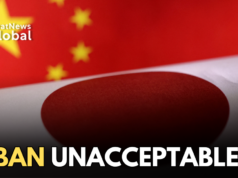Australia is set to pass a new law on Thursday easing the deportation of non-citizens to third countries — a move that has reignited criticism from human rights groups, who accuse it of “dumping” refugees on small island nations and drawing parallels with US President Donald Trump’s hardline immigration policies.
As the United States seeks Pacific Island nations willing to accept deported non-citizens, Australia last Friday signed a deal with Nauru to resettle hundreds of people who have been denied refugee visas because of criminal convictions.
Limiting Court Appeals
The planned new law removes procedural fairness when Australia deports a non-citizen to a third country and is designed to limit court appeals, said the government. It is expected to pass in Australia’s parliament after the opposition Liberal Party said it would support the move.
Australia will pay an upfront A$400 million to establish an endowment fund for the resettlement scheme, plus A$70 million a year in costs, Nauruan President David Adeang said in a budget speech last Friday.
Two-thirds of Nauru’s revenue last year, or A$200 million ($129.96 million), came from hosting an Australian-funded processing centre for asylum seekers.
Nauru, which has a population of 12,000 and a land area of just 21 square km (eight square miles), is reliant on foreign aid, and faces a 2025 deadline to repay Taiwan A$43 million ($27.94 million) after switching diplomatic ties to Beijing, according to budget documents.
New Law To Cover Different Group
Under a decade-old policy to discourage people smuggling, Australia sends asylum seekers who arrive by boat to offshore detention centres to have refugee claims assessed, denying them Australian visas. The practice has been criticised by the United Nations Human Rights Committee.
The new Nauru resettlement scheme will cover a different group, whose visas were cancelled by Australia because they served prison sentences or were refused visas on character grounds, and cannot return to countries including Iran, Myanmar and Iraq because of the risk of persecution.
Australia’s High Court ruled in 2023 that indefinite immigration detention was unlawful, resulting in around 350 non-citizens being released into the community, with a third subject to electronic monitoring.
One of this group, a 65-year-old Iraqi man, lost a High Court appeal against deportation to Nauru on Wednesday.
Criticisms
Law Council of Australia President Juliana Warner said on Wednesday the deportation law was “troubling” because it could put those sent to Nauru at risk of not receiving necessary healthcare, and is being rushed through parliament without adequate public scrutiny.
Several independent lawmakers said they were concerned it could be applied more widely than the 350 released by the High Court decision, with up to 80,000 people in the community without a visa.
Home Affairs Minister Tony Burke declined to comment on the 80,000 figure, and has said the law change is needed to maintain the integrity of the migration system.
The move was “absolutely Trump-like”, said Jana Favero, the deputy chief executive of the Asylum Seeker Resource Centre.
Independent lawmaker Monique Ryan told parliament she was concerned stateless individuals and refugees who had never been convicted of a crime would be sent offshore without proper oversight, and Australia was “using a small island nation as a dumping ground”.
(With inputs from Reuters)





